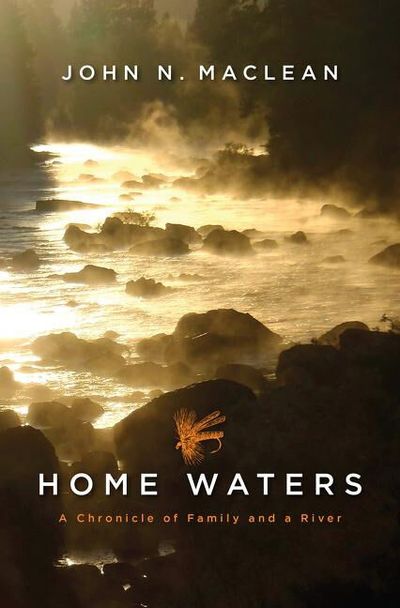‘A River Runs Through It’ gets a backstory worth the wait from Norman Maclean’s son in ‘Home Waters’

If you’re expecting an unbiased take on anything to do with “A River Runs Through It,” I should disclose that my son’s middle name is “Maclean.” This is not some cute happenstance. We named him after the author whose novella about flyfishing and Montana transformed both.
To me, Norman Maclean’s book, more poetry than narrative, is a triumph of American literature. Only my wife’s good sense kept his surname from higher billing on the boy’s birth certificate.
His son, John N. Maclean, is also an author, and his latest book, “Home Waters,” is a lyrical companion to his father’s classic chronicling their family’s history and bond with Montana’s Blackfoot River. His storytelling – from fishing with his dad to the life and death of his uncle Paul – is reliable, elegant and charming.
After a 30-year career as a journalist, mostly as a correspondent for the Chicago Tribune in Washington, D.C., the younger Maclean took to writing well-received nonfiction about wildfires in the American West. He hadn’t considered a family memoir.
Then, he caught a big trout – a really big trout – while fishing a stretch of the Blackfoot that his father memorialized in “A River Runs Through It,” published in 1976. He wrote about that fish, “the fish of a lifetime,” he called it, for a local club of anglers, and, then, with some prodding, expanded the tale for a regional magazine.
That was the end of it, he thought, until a couple years later when an editor unearthed the magazine article while on vacation in Montana. Did Maclean want to write a book?
“I thought this was going to be a big fish story, but then it turned into something very different,” says Maclean, now 78. “I don’t call it a memoir. I call it a chronicle. A memoir is about you, and this isn’t all about me.”
Indeed, “Home Waters” is about geology and glaciers and the forming of a river. It’s about history and Meriwether Lewis and how larch trees grew to be giants. It’s about nostalgia and cross-country car rides to a family cabin by Seeley Lake in Montana and how generations of Macleans became tied to a place. There’s also a fair bit about trout and his famous father’s book.
“I do not fish alone on the Blackfoot River, ever,” Maclean writes, “even though now I mostly fish by myself. When I’m on the water, and especially when no one else is around, I feel the presence of generations of my family whose stories run through it.”
Maclean’s writing is often intimate. Family lore, told and retold, can be a fuzzy thing, but some memories about his father, like their first time fishing together, remained spectacularly vivid and personal.
“I could not write it,” Maclean says of that childhood outing. “It was just too much. Too overpowering. But when I got to a place in ‘Home Waters’ where it was appropriate, I knew I had to do it.”
“Home Waters” was not meant as a “conscious parallel” to his father’s literary achievement, Maclean says, but we do learn more about the characters and stories that made “A River Runs Through It” so splendid.
After reading an early version of “Home Waters,” a friend told Maclean, “You’ve written the backstory to ‘A River Runs Through It.’ ” “I said, ‘I’ve done what?’ I almost fell off my chair.” “Home Waters,” though, stands nicely on its own.
Fans of “A River Runs Through It,” and particularly those of the movie adaptation, will find intrigue in Maclean’s investigation into the death of his uncle.
In the film, Paul – played by a young Brad Pitt – is beaten to death in Montana. In reality, he was murdered in a Chicago alley, and, although conspiracy theories abound, the circumstances remain a mystery. “I wanted to straighten people out,” Maclean says.
Maclean concedes that his father’s book is “more consistently poetic” than his own, but he makes no apologies, noting that the older Maclean was a renowned English professor at the University of Chicago.
“I didn’t spend my career teaching Shakespeare and Wordsworth,” he says. “I spent my career writing hard news. That’s me.”
While Maclean’s journalistic prose is sharp and concise, it can also be beautiful. In one instance, he describes coming upon his father as daylight faded on the Blackfoot.
“He stood there next to the river, framed by bluffs and mountains to either side and the river running through them,” he writes, “and with his arms outstretched, he gazed upward at the sunset with that open, ecstatic expression on his face that arose only in moments of greatest joy. He stood like that for minutes.”
When “A River Runs Through It” was published 45 years ago, the Blackfoot River was a polluted mess and a lousy spot to fish. The book – and certainly the film in 1992 – brought celebrity status to the river, and conservation efforts brought its restoration.
“It’s better now than anything I remember from when I was a kid,” Maclean says. The river’s prominence and renewal, though, have created contemporary challenges.
“Fisherfolk,” Maclean writes, “dressed in fresh-from-the-box Stetson hats and vests” crowded onto Montana rivers, and “the Blackfoot River became a heavily trafficked ‘must’ stop.”
The pandemic has hastened that spectacle. Celebrity, even for a river, has its price. “There is trouble on the river now because it is overused, and nothing is being done to sensibly restrict its use,” Maclean says.
“But I’m hoping that ‘Home Waters’ contributes toward the general movement to try to do something. Otherwise, we will love it to death.”
Nick Ehli, a freelance writer and former editor of the Bozeman Daily Chronicle, teaches in the Honors College at Montana State University.